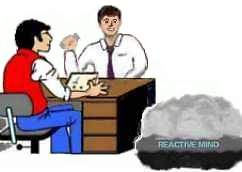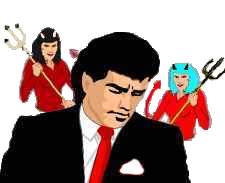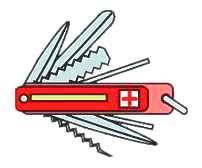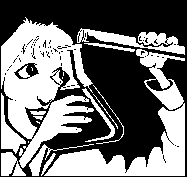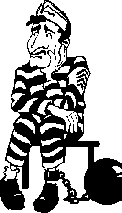Living with Right and Wrong |
|||||||||||
|
You have read a lot about service computations and about the insisting upon being right, 'make wrong' and evil intentions. But let us for a moment look at all this from an everyday perspective. How do we deal with this outside the auditing situation? There are certain data that apply to this and certain conduct you can adopt to deal with this in an everyday setting in a much better way. It's a well known fact that rightness and wrongness are the basis for endless arguments and struggles. Rightness and wrongness are a very dominant pair of considerations in all human activity. It reaches very high and very low on the tone scale.
You can see the insistence upon "I am Right and they are wrong" goes way down and be the last hard fought idea by a person who is very unaware of just about anything else. Things are not made easier by that rightness and wrongness is very much dependent upon who is viewing it. It depends upon moral codes and values. It depends upon what groups one belongs to and what groups one are naturally opposed to. It can depend on future and unknown consequences of an action. The law defines 'sanity' as the ability to tell right from wrong, but even that is based on opinion. When you realize that the common goal for all activities in life is survival things become a little clearer. It isn't new that things seek to survive. The new realization is, that this is really the only thing all life impulses seek to do. It is not only the thing humans have in common with the smallest insect or weed. It is also the power and pulse and ever present intention in every human activity. To understand that fully you have to realize, that we operate on eight dynamics. Survival isn't only seen as "survival of the fittest", the formula Darwin made famous. Man's basic goodness is that he ultimately seek all life forms to succeed. That doesn't mean he won't defend and fight for his obvious interests, such as his own children, spouse and friends. But given no or little hostile opposition from other people or life forms, he wishes them well - he wishes they will survive. In the long run this also guarantees his own survival. There will be animals to hunt and crops to harvest and friends to be made in the future if he takes care of other people, life forms and nature today. When we have isolated survival on the
eight dynamics as the dynamic force behind life we can suddenly define an
overt act in a much more meaningful way. In religion, such as the
Christian Church, it is called sin, but the Church defines it based on the
Ten Commandments and other moral codes and rules from the Bible. This is
defined on the basis of Divine Law and authority rather than reason.
Therefore the compulsive
wrongness can be If you have the person explain what is right about their way of going about things you are starting out right. You see, this has even been in the Auditor's Code all along. This has wide applications - in marriage and friendship. At work and casual social contact. In law and in dealing with children. Example: A wife is always using too many spices in her cooking. Despite angry arguments, threats of divorce, anything, it does not change. Her compulsion continues. One can change this wrongness by having her explain what is right about her cooking. This may start a new heated argument in some extreme cases, but if one goes ahead and flattens the question, it will all be overcome and she will happily stop to over-apply spices in her cooking. If this approach is run as a formal process you may very well run into a moment in the past when she accidentally dropped too many spices into the dinner pot and could not face up to having done a wrong action. To be right she thereafter had to over-spice her cooking. If you were to go into a prison and try to find one sane inmate who said he did wrong you wouldn't find one. Only the broken wrecks will say so out of fear of being hurt. But even they don't believe they did anything wrong. But if you interviewed a hard core bank robber about what was right about his crime and by giving him a bit of admiration for his inventiveness and 'professional skills' you would find a very cooperative and communicative person. He will show you all kinds of tricks of the trade. Keep this up and somewhere down the road he could suddenly realize, that this was not the only profession he could pursue. He may realize where his real constructive skills were and start to apply those to the benefit of others. A judge sentencing criminals all day long would probably blow up in your face if you tried to tell him that all these lawbreakers he sentenced would just have been hardened a little more by the process. The judge might tell you he often had wondered about it. But he is more likely not to allow himself to say that. A social worker runs into social clients every day that apparently want to change their ways, but will soon discover the majority only say so in order to receive the immediate benefits, such as cash or other help. Using the above data and patience and a bit of time such a social worker could actually start to help his/her clients for real by asking and flatten the question of what was right about the life-style they seemed trapped in. This could lead to a complete change of life-style and real help for the clients. These facts and this principle are valid in all of life. The student who can't learn, the worker who can't work, the boss who can't lead are all caught up at one side of the right-wrong issue. They are being completely one-sided. They are being "last-ditch-right". And opposing them, those who would teach them, are fixed on the other side "admit-you are-wrong". And out of this we get no-change; often we get destructive fights where two parties both insist upon their rightness and the other's wrongness. There is nothing to win for either side, only losses for both when it is all added up. Thetans on the way down don't believe they are wrong because they don't dare believe it. And so they do not change. Sometimes you will run into a preclear in auditing who is only trying to prove himself right and the auditor wrong, especially on the lower case levels, and so we sometimes get no-change for a session or program. And those who won't be audited at all are all too often found to be totally fixated on their own asserted rightness. Their problem is, they are so close to be gone that any questioning of their own past rightness would completely destroy them - or so they feel. You can be right! But how? By getting another to explain how he or she is right - until he or she, becoming less defensive gradually, eventually can take a less compulsive point of view. You, the listener, don't have to agree with what they think. You only have to acknowledge what they say. And suddenly they can begin to see things for what they are and be truly right. A lot of things can be done by understanding and using this mechanism. It does take some study of these data before it can be gracefully applied, because we are all being reactive to some degree on this subject. And those who sought to enslave us did not neglect to install, by implanting, a right-wrong pair of purposes and items on the far back track. But even these purposes will get out of your way the moment you realize how to rehabilitate somebody's rightness. And you can be right, you know. The road to rightness is the road to survival. And every person is somewhere on that scale. You can make yourself right, amongst other ways, by making others right enough for them to afford to change their minds. Doing that will mean that a lot more of us will arrive. Related to the above is the subject of manners. This is the primary system Man uses to oil the machinery of relationships: "Good Manners". The subject is headlined with words like, politeness, courtesy, etiquette, refinement of conduct, culture, respect and civility. To some these things may seem to be based on arbitraries and the ultimate in indoctrinated, learned, artificial and unnatural behavior. But "Manners" is an idea that has been around since the beginning of time. Each culture or social group may have their own brand of manners. You may think of the Court of Louis 14 in France; King Arthur and his men or your old boarding school. Maybe what comes to mind is your aunt, that always corrected and instructed you in 'how to behave' when you were a kid. So the subject may seem very artificial and strange to you. And some of it probably was and still is.
But it becomes clear, that good manners do have a very basic function, when you see how apparently primitive peoples respect a very complex set of manners among themselves and in dealing with rival tribes in a friendly manner. You have the social rituals, the etiquette and social correct conduct as a practical system of establishing ARC. The manners are the rules and agreements; that is the Reality corner of the triangle. The C - Communication, is the willingness to listen to and acknowledge and respond in a disciplined way to the other person's communication. The A - Affinity, is respect for the other person, his views his habits, culture and so on. You allow him to be as he is and in your space. When you add this up it becomes understanding in a social setting. You can start to trade, exchange experiences and learn from each other and live in peace. So you will see each group and culture develop their own customs, habits, likes and dislikes. This materialize in their social conduct, etiquette and manners. When you realize, what you are looking at is the Reality part of the ARC for that group you have the key to be successful in dealing with such a society, group or primitive tribe - or even one strange individual with "incomprehensible ideas and beliefs". It applies to deal with hostile persons or people momentarily upset with you. In all races, groups and cultures "bad manners" are condemned. They may be defined very differently from group to group. But those with "bad manners" according to the ruling agreements are rejected. Thus you could call "Manners" the basic technology of social contact and Public Relations. Any person doing Public Relations or diplomacy will have to realize that. And we all need to take care of such matters in countless situations. If you want a job or position you need to present yourself in a good light. If you have to negotiate you need it as well. Any delicate or difficult situation takes a little bit of PR, good manners and diplomacy to be dealt with successfully. "Bad manners" on the other hand, can make the best of efforts fail, because the person is rejected up front and never listened to. Bad manners on a broad scale would be arrogance, disruptive behavior, unwillingness to listen to anything the other has to say. Simply being dirty, badly dressed, bad breath or not being there in time for a meeting are all bad manners in anyone's book. It is repulsive behavior as it breaks down the ARC. Insisting upon 'I am right - and you are wrong' is also perceived as bad manners universally.
Whatever the local motions or rituals are, these two factors are involved. They are true in dealing with King Louis 14's Court or a primitive tribe, the local labor union or the Mafia. Thus a person violating them will find himself and his endeavors rejected. Arrogance and force may win dominance and control in the short run; but will never win acceptance and respect. Many a brilliant man never won applause or general goodwill and respect because he was arrogant beyond belief and held others in contempt. No militant conqueror will ever win true dominance because they are covertly and overtly rejected and fought. They certainly lack "good manners" as they do not (1) consider or give others a feeling of importance and (2) they are total strangers to a comm cycle. Social Relationships Importance If you ignore people it tends to back-fire. Flattery is not very useful. It is suspect, as it does not come from a sincere belief and is perceived as false. A person's importance is made clear to him by showing him respect, or just by assuring him he is visible and acceptable. To see and acknowledge the existence of someone is to grant them beingness and importance to him. To know somebody's name, background and connections also grants importance. Bragging about one's own importance is about as acceptable as throwing rotten eggs. People have value and are important. Big or small they are important. If you know that, you are half way home with good manners. Thus social contact and exchange can occur. Communication Communication, without the Comm cycle being in first, does not work. The comm cycle must exist before it carries any message. Messages do not travel on no-line. Advertising is routinely violates this. "Buy our tooth paste!" is dumped Into empty space. Good manners require two way communication. This is even true of social letters and phone calls. Out of this one gets "telling the hostess good night as one leaves". One really has to understand the two way comm cycle to have really good manners. Without a two way comm cycle, social contact, diplomacy, advertising and PR is pretty lame. Prisoners of War "Good manners" may be less apparent in our times than in the past. This is because the mixing of so many races and customs have tended to destroy the ritual patterns, the etiquettes and cultural agreements, which in the past were so well established in a smaller group or an isolated society. So one may think it is ok with sloppy manners. But really there is no excuse for ignoring the basics. One can have excellent manners by just observing:
|
|||||||||||



